Wonka
 for some violence, mild language and thematic elements.
for some violence, mild language and thematic elements.
Reviewed by: Alexander Malsan
CONTRIBUTOR
| Moral Rating: | Average |
| Moviemaking Quality: |
|
| Primary Audience: | Family |
| Genre: | Family Musical Fantasy Comedy Adventure |
| Length: | 1 hr. 52 min. |
| Year of Release: | 2023 |
| USA Release: |
December 15, 2023 (wide release—4,203 theaters) DVD: February 27, 2024 |
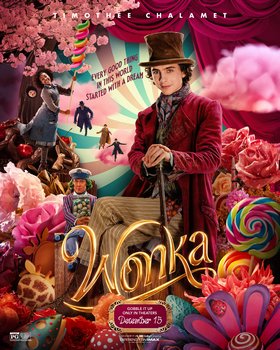

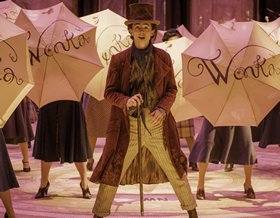
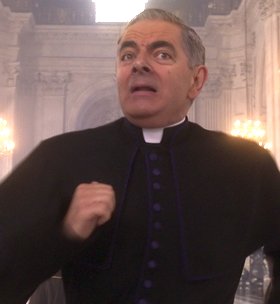
Musical fantasy films
Eccentricity
Having large hopes and dreams
Never giving up hope, even when all hope seems lost
Prequel origin story of the fictional character Willy Wonka
 Willy Wonka and the Chocolate Factory (1971) — was based on the 1964 novel Charlie and the Chocolate Factory by Roald Dahl
Willy Wonka and the Chocolate Factory (1971) — was based on the 1964 novel Charlie and the Chocolate Factory by Roald Dahl
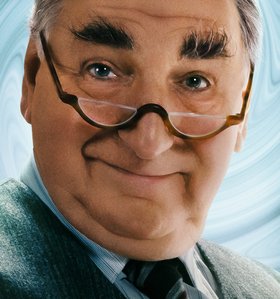
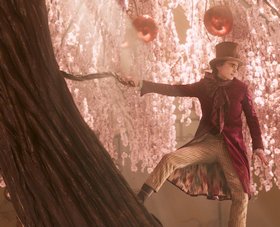
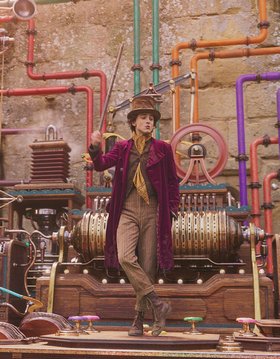
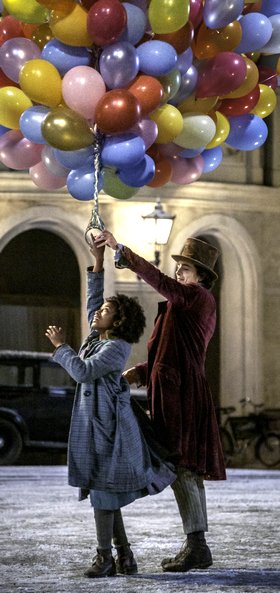
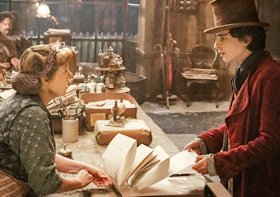
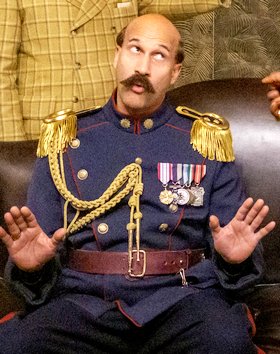
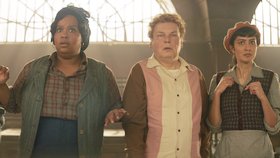
| Featuring |
|---|
|
Timothée Chalamet … Willy Wonka Colin O’Brien … Young Willy Wonka Olivia Colman … Mrs. Scrubbit Hugh Grant … Oompa-Loompa Sally Hawkins … Willy’s Mother Keegan-Michael Key … Chief of Police Rowan Atkinson … Father Julius Mathew Baynton … Fickelgruber Charlotte Ritchie … Barbara Sophie Winkleman … The Countess See all » |
| Director |
|
Paul King |
| Producer |
|
Heyday Films [England] Village Roadshow Pictures See all » |
| Distributor |
“Every good thing in this world started with a dream”
Willy Wonka (Timothée Chalamet) has big chocolatey dreams. He has 12 silver sovereigns in his pockets and an optimistic look on the future ahead of him: one that includes him opening and owning his own chocolate shop and even someday his own chocolate factory. Actually, Willy had to spend some of those sovereigns: shining his shoes, food, so now he’s down to no tuppence left. Even with no place to sleep, and just the clothes on his back and his suitcase of dreams, this won’t deter Willy, no sir!
“Say, you look like a guy who’s in a bit of a predicament?” Do you need a place to stay?” says a mysterious looking fellow to Willy. “Well it is mighty cold out tonight, so sure why not?” Wonka has always been one to rely on the goodness and kindness of others.
Soon thereafter Wonka arrives at the inn of Mrs. Scrubbitts (Olivia Colman). “I have no way to pay you for my stay right now,” Willy says. “No worries, I’ll give you a whole day and then you pay me back at the end of tomorrow,” says Mrs. Scrubbit. Sure enough, Wonka acquires the tuppence but Mrs. Scrubbit is NOT as kind and loving as she appears to be and sure enough Willy ends up in servitude to Mrs. Scrubbit and her henchman Bleecher working in her sweatshop. How is Wonka going to achieve his dreams now?
Through the help of an intuitive little girl, Noodle, and some others stuck in the sweatshop, Wonka is able to temporarily escape from time to time and promote his chocolatey adventures. The public, in turn, really loves his chocolate. It’s like nothing they’ve ever tasted! Well, almost all of the public. Of course, chocolate THAT good is bound to make a few enemies such as Wonka’s competitors: Fickelgruber, Prodnose and Slugworth. They’ll do anything in their power to ensure Wonka never sells chocolate in their city as long as he lives and breathes.
But like I said before, you can’t keep a good chocolatier down! Especially if that man just happens to be the one, the only Willy Wonka.
The original “Willy Wonka and the Chocolate Factory” (1971) with Gene Wilder is by far one of the most iconic and treasured movie-musicals of all time. While there have been attempts to replicate it (let’s not even discuss Johnny Depps’ 2005 awkward and just creepy retelling), nothing can really touch the original, at least in my opinion.
From the incredible scenery (I mean, come on, the chocolate river in the original film was made of REAL CHOCOLATE), the stellar performances (I mean Julie Dawn Cole as Veruca Salt is a performance that is still talked about to this day) and the songs that have transcended time (“Pure Imagination,” “Cheer Up Charlie,” “Golden Ticket”), it’s hard to find a movie-musical from that era that has left such a lasting impact today. So when I read the announcement in the news (actually it was on here) that a prequel to the 1961 film was going to be made, I was incredibly skeptical, even up to the point of the actual showing.
“Wonka” does not try to copy, moment to moment, everything from the original film. Let’s be honest, nothing could. What I can appreciate though, is “Wonka” is a completely original, standalone film, sure, but then also presents itself with just enough nostalgia where those of us who have grown up with the film (such as my friend and I) can sit in our seats and go, “Wait, there’s that from the original film! How subtle and cool is that?” “Wonka” at times is like eating a chocolate bar with nuts in it. You can appreciate both the sweet and the salty (well, the saltiness to a point, but I’ll get to that in a moment).
Performance-wise, Timothée Chalamet is no Gene Wilder and he, himself, has stated that he wasn’t trying to copy Wilder completely but wanted to incorporate portions.
However, while I’ve never been Timothee’s biggest fan, I can respect and appreciate his performance as the young Wonka. He brings a much younger, more naivé chocolate maker to the screen, but doesn’t present Wonka as stupid, careless or carefree. There are layers to this Wonka, and while we don’t see it all on display, we still see enough to understand why the adult Wonka (the Gene Wilder Wonka) becomes who he becomes.
Likewise, I have to commend Olivia Colman’s performance as Mrs. Scrubbit. She is, by far, a legend among legends in Hollywood (“The Crown,” “Broadchurch” are some of my favorites I’ve seen her in) and this film, once again, gives proof as to why. She is a dastardly villain (one of many) that you really love to hate and that’s half the fun.
As for the music of the film, Neil Hammon’s music both inspires and confuses me at times. There are songs (and I can say this as a music educator and musician of many years) that sometimes compliment the film and then some that felt a little out of place. For example, “You’ve Never Had Chocolate Like This,” had this light wit and humor and upbeat feel that reminded me a lot of “I’ve Got a Golden Ticket.” Additionally the duet/ballad “For a Moment” reminds me a lot of the song, “Cheer Up Charlie” that was sung by Charlie’s mother in “Willy Wonka…” However, there are songs that just feel out of place such as “Sorry, Noodle,” and “Sweet Tooth,” but even these really didn’t detract from the overall appreciation of the music as a whole, as, in general, the songs compliment what is occurring on screen.
Content for Concern
Violence: A servant girl is seen being physically thrown into a bird coop a few times. A character is hit on the head and knocked out. Another character is waterboarded briefly. An Oompa Loompa hits a character on his head and foot with a frying pan. People are poisoned by candy which turns their facial hair into different colors and one child even grows a mustache. People are seen throwing things around a shop and destroying it. A fire breaks out in a candy shop and destroys everything inside. A couple people almost drown in chocolate. Someone is on a boat that explodes (the person is okay).
Profanity: G*d, (1) Geez (1)
Drug Content: A chief of police is successfully tempted into accepting a chocolate bribe because he’s addicted to it. His character grows fatter and fatter throughout the film; in fact, he talks about chocolate like someone might talk about a drug, saying he needs more to get the “same hit” he got earlier. In Willy Wonka’s world, it seems people can get heavily addicted to chocolate (to which those 500 “chocoholic” monks lend additional credence). A character technically drugs a couple people with his chocolate, as well. For example, he gives a man a chocolate that simulates a full course of various alcohols (the effects of which, we should note, the man is completely unaware of). It culminates with the man eventually falling unconscious after calling an ex-girlfriend in his drunken stupor.
Alcohol: We see an Oompa Loompa fixing himself a cocktail. We hear a couple other comments about alcohol, too.
Sex: A character states, “thankful for the ankle, pleased for knees, and if you want to make her sigh, show her some thighs.” We later see a man wearing lederhosen trying to entice a woman. He tries to bend over in his lederhosen to emphasize his rear end. The man is later seen wearing feminine pajamas. As part of a dance number, someone slaps their rear. A man and a woman kiss. We hear a reference to using money to buy lingerie.
Other: A woman tricks a man into signing a contract with fine print. Someone passes gas (as part of a transition scene). Someone mentions that a bug that is inside of the chocolate people eat will eventually come out of people’s rear ends.
Inaccurate Portrayals of Christianity: A church is shown, in this film, as incredibly corrupt, with a very corrupt cleric who is addicted to chocolate, and chocoholic monks. *MINOR SPOILER* Their jobs are to safeguard the chocolate vault of the three Chocolate Giants (Slugworth, etc.) located beneath the church.*END MINOR SPOILER*
There are several, somewhat offensive, pokes at Christianity and religion at times in the film, which will make some Christians uncomfortable for sure. In one scene, the church is scheduled to host a funeral, and Father Julius warns the 500 monks that the wife attending is actually pious, so they need to act the part. He also tells the monks that they will one day be judged for their sins, “but it’s not going to be today—amen!” Quotes from the corrupt cleric include statements like, “I sold my soul for thirty pieces of chocolate!” and “I’m a weak and wicked chocoholic!”
Morals
“Wonka” is a story about having large hopes and dreams, sure, but it’s also about never giving up hope when all hope seems lost. Wonka walks into London with a large dream and ends up in the sweathouse and in the dumps. He has enemies from all around coming after him, hoping to see him fail. Most in his predicament would simply give up and say, “This is the hand I’ve been dealt.” But throughout the film we watch as Wonka continues to take a positive outlook on each and every situation he’s provided.
As a Christian, we’re sure to have struggles, trials and temptations thrown at us. There are times we are going to feel like the whole world is against us, and we will ask God, “Why?” But as Christians we are asked to trust God, in the thick and the thin, the good, the bad, the in-between.
“Do not be anxious about anything, but in every situation, by prayer and petition, with >thanksgiving, present your requests to God. And the peace of God, which transcends all understanding, will guard your hearts and your minds in Christ Jesus.” —Philippians 4:6-7
We also must remember we are not only fighting ourselves but spiritual enemies in the process…
“For we do not wrestle against flesh and blood, but against the rulers, against the authorities, against the cosmic powers over this present darkness, against the spiritual forces of evil in the heavenly places.” —Ephesians 6:12
Trusting God seems hard, but in truth, it isn’t when God is for us.
“What, then, shall we say in response to these things? If God is for us, who can be against us?” —Romans 8:31
John reminds of this….
“Little children, you are from God and have overcome them, for he who is in you is greater than he who is in the world.” —1 John 4:4
“We know that everyone who has been born of God does not keep on sinning, but he who was born of God protects him, and the evil one does not touch him.” —1 John 5:18
Closing Thoughts
“Wonka” in many respects is like one of their Scrumdiddlyumptious bars: there’s some sweet heartwarming moments (much like the toffee in the bar), some crispy and edgy moments to the film (much like the cookie in the bar), and some crunchy and not so wonderful moments (much like the peanuts in the bar, if you’re someone who doesn’t like peanuts). Altogether, though, “Wonka” works because it’s a story that entertains both young and old, with a heartwarming message of being true to yourself, true to others, and chasing one’s dream.
Of course, sadly, like expired candy, “Wonka” has content that is less than to be desired: some sexual innuendo and content, alcohol and drug references and mild to moderate amounts of violence. Additionally, there are some negative stereotypes of Christianity on display (these scenes never last more than 10-15 minutes of the total screen time, but nevertheless deserve mentioning.)
I believe “Wonka” to be a fairly safe and enjoyable film for most families to view. It’s not perfect, by any stretch of the imagination (see what I did there?), but its hard to find many children’s films these days that are squeaky clean. All in all, I recommend this film for older children, teens and adults, but parental viewing is recommended before allowing your children to see it due to the above mentioned content.
- Violence: Moderate
- Drugs/Alcohol: Moderate
- Profane language: Mild
- Sex: Mild
- Nudity: Minor
- Vulgar/Crude language: None
- Occult: None
- Wokeism: None
See list of Relevant Issues—questions-and-answers.


There were only some mildly vulgar or suggestive comments occasionally, and a bit too much drinking at the beginning. They did show a rainbow and rainbow sidewalk near the end, and I wondered about that, but perhaps we are understandably a bit paranoid about that these days.
Honoring your mother was a strong theme in the movie. I’d recommend this one as it’s the best secular movie and musical I’ve seen in a while. You do have to appreciate the Rowan Atkinson’s comedic timing and sometimes slightly off the wall antics, to enjoy it. It was just family entertainment and didn’t contain any WOKE agendas or comments. It was such a refreshing change to see a movie the whole family can enjoy.
Moral rating: Better than Average / Moviemaking quality: 5
WOW! Wonka (2023) has become one of my favorite feel-good movies to watch anytime without worrying who’s in the room! There is some (very mild) violence, sexuality, and alcoholism (on and off camera), but otherwise, this is a very family-friendly movie! Two thumbs up!
Moral rating: Better than Average / Moviemaking quality: 5
The film does have some anti-Catholic elements though, as one of the antagonists is a corrupt priest whose church is a cover/front for the “chocolate cartel’s” laboratory. He also tells the monks before a funeral that one of the attendees is a little pious.
Despite this, Wonka is portrayed as a hopeful and prolific chocolate entrepreneur that wants to do everything possible to live his dream and carry on his mother’s wishes and legacy. He also works very hard to help his friend Noodle find peace in her life.
Moral rating: Offensive / Moviemaking quality: 3½
Moral rating: Extremely Offensive / Moviemaking quality: 5
Moral rating: Extremely Offensive / Moviemaking quality: ½
Look, I know that Hollywood has always had it out for Christianity, and many will just dismiss my own thoughts on this film solely on that basis. But let me ask you this: which of these two things does the movie criticize, Christianity itself and the Church as an organization or the people within the church who abuse their power and righteous image for their own benefit?
This is a pretty big, but important difference that many people need to understand, because while God Himself and the Word He gives us is infallible, the people in the church who are expected to represent him are not. And throughout history, we’ve seen countless people who have claimed to have a deep, selfless relationship with God, when, in actuality, they’re corrupt individuals who seek to have everyone wrapped under their finger.See all »
Moral rating: Better than Average / Moviemaking quality: 4
PLEASE share your observations and insights to be posted here.
I. It is an origin story nobody asked for which has no basis in either “Charlie And The Chocolate Factory” or “Charlie and The Great Glass Elevator.” Furthermore, Felicity Dahl, Roald Dahl’s second wife, approved the inclusion of Willy Wonka’s backstory in “Charlie And The Chocolate Factory” starring Johnny Depp, in addition to being an executive producer on the new adaptation. She is not involved in the production of Wonka from what I have read.
II. This is supposed to be a prequel to the awful musical “Willy Wonka and the Chocolate Factory.” I love musicals, but the movie took way too many liberties with the novel. Even though Roald Dahl was credited as the screenwriter, his script was heavily rewritten by Dave Seltzer. The producers decided to keep Dahl’s name in the credits to give the moving picture credibility. Dahl hated the resulting concoction so much, he disowned the film and refused to give the movie rights to the literary sequel.See all »
Our family has grown up with and all dearly love Charlie and Willy Wonka. It was a magical part of childhood. We will not however support the new film by attending because of its destructive sub plot against the church. Any film that portrays the church as evil deserves to be avoided and not supported. I encourage you to turn away from it.See all »
Moral rating: Very Offensive / Moviemaking quality:
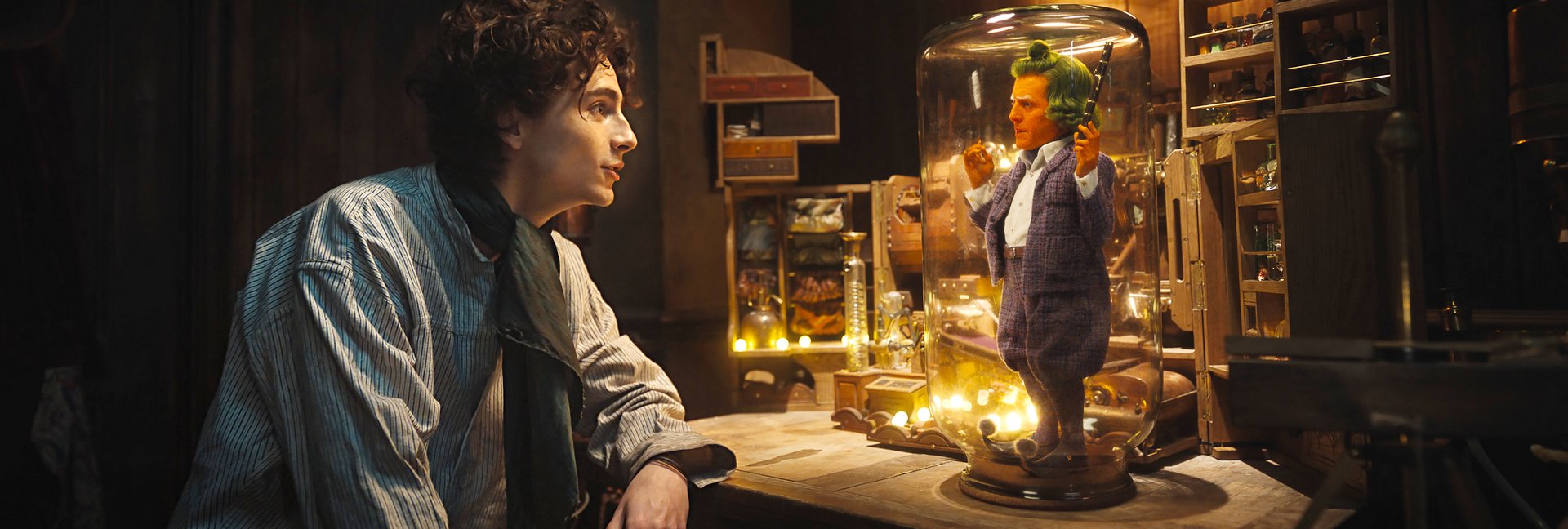
 Charlie and the Chocolate Factory
Charlie and the Chocolate Factory
Musically, the songs were quite good and I appreciated the occasional interpolation of Leslie Bricusse and Anthony Newley’s Pure Imagination at some points in the story. It’s initially heard in a lovely, semplice but emotional “one finger piano” rendition in the opening credits and then referenced here and there, before the full blown song at the end, with the lyrics subtly altered. It was great that they made Hugh Grant’s Oompa Loompa look as the little men did in the Wilder film and also retained the Oompa Loompa song structure. It was magical, with great character actors and I single out Paterson Joseph, as he was very debonair—but cunning—as Slugworth.See all »
My Ratings: Moral rating: Better than Average / Moviemaking quality: 4½